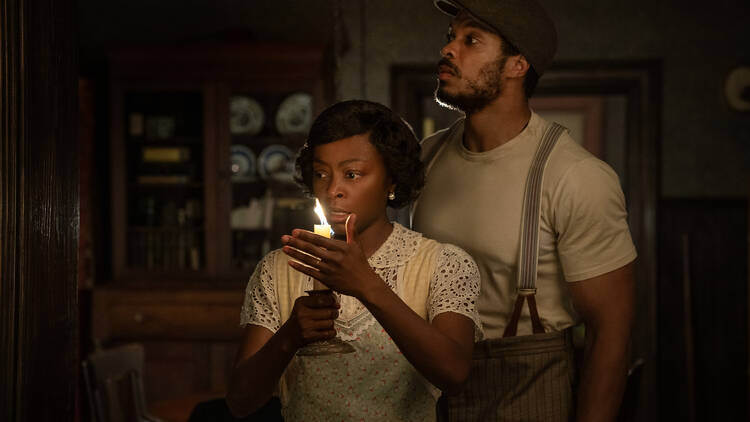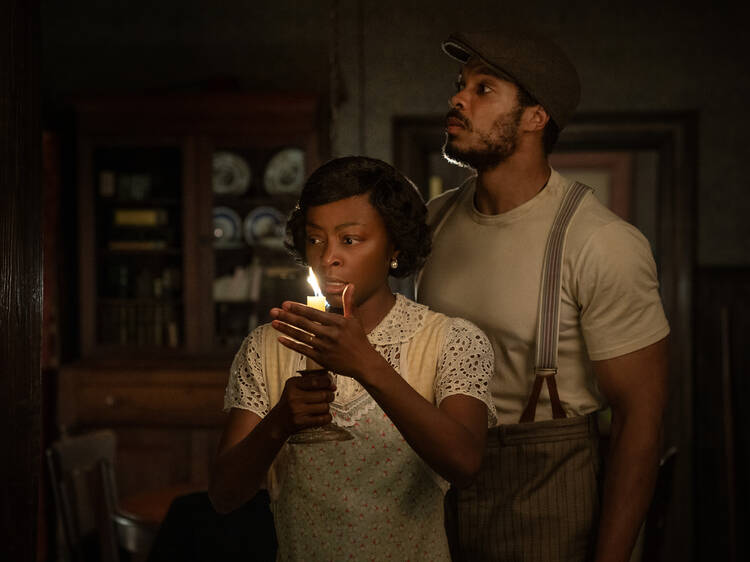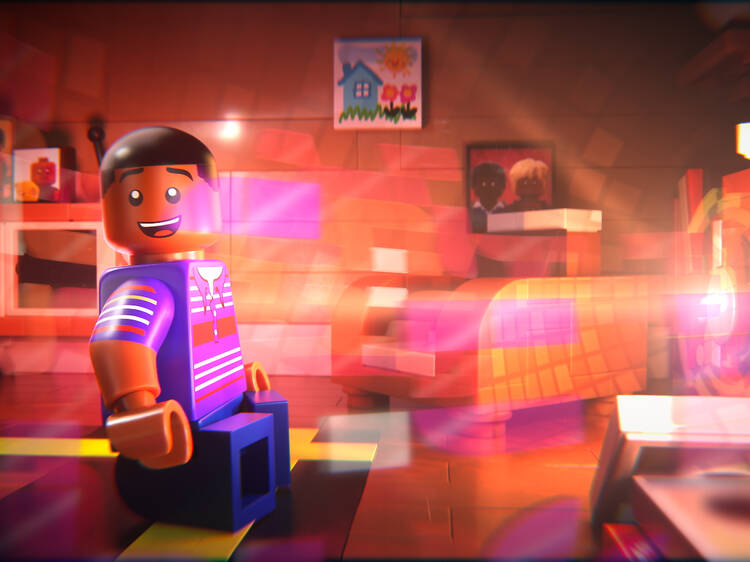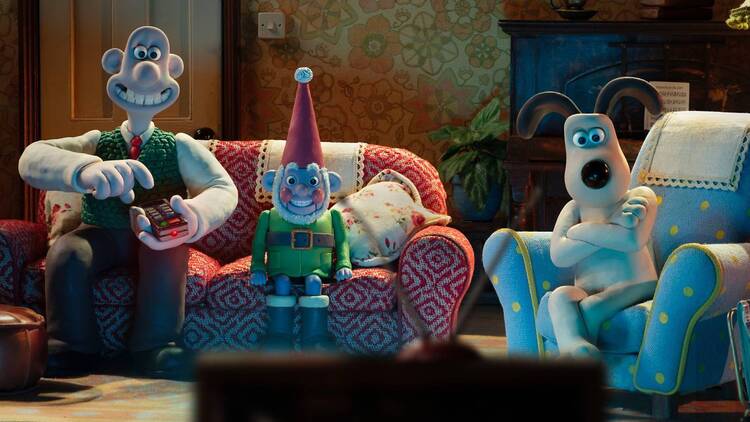The Piano Lesson serves up fresh, a tale of family legacy, with a side of spirit-laden blues that’s equal parts haunting and heartwarming. It’s adapted by Malcolm Washington (son of Denzel, a producer here) and Mudbound’s Virgil Williams from one of August Wilson’s iconic 1980s ‘Pittsburgh cycle’ plays – and is all set in one family home in 1936 Pittsburgh. From this Pulitzer-winning material, the debut director crafts a film that’s steeped in history but somehow alive with modern vibes. Centred on one Black American family and their impossibly heavy, both spiritually and literally, heirloom piano, he brings history to life with elegance and rawness, making you feel the very weight of inherited struggles. It’s a family affair on both sides of the camera. Malcolm’s brother, Tenet’s John David Washington, plays the family’s forceful son, Boy Willie, whose driving ambition is to own the land where his ancestors were once enslaved. To raise the necessary funds, he plans to sell the family’s heirloom piano – a decision that sparks a powerful conflict with his sister, Bernice, portrayed by an Oscar-worthy Danielle Deadwyler (Till). Samuel L Jackson is a calming influence as their wise, steady uncle. You leave the cinema feeling the weight of this story, yet oddly uplifted with it. Strong as the performances are, the star of the show is the piano itself. It isn’t just a piece of furniture but a character carrying the scars, etchings and songs of the family’s ancestors. Washington
It’s important to clarify what kind of documentary No Other Land is. It follows the life of Basel Adra, a young Palestinian man living in Masafer Yatta, a collection of 20 small villages in the West Bank. Since childhood, Basel has filmed life in the village. As he’s grown up, he’s been predominantly recording the destruction of his home and those around it. Masafer Yatta is disputed land. Repeatedly, Israeli soldiers come to tear down the houses of Palestinians, stating that they’re illegally built on an Israeli military training ground. From 2019 to 2023, when the film ends, this cycle continues. Every time a home is rebuilt, it’s destroyed. This is not an objective documentary. There’s no voice of the Israeli military or government position. The only Israeli voice in the film is that of Yuval Abraham, a journalist who says upfront that he believes the destruction of the houses is a crime. There is no attempt to view things from both positions. And that is entirely valid, because it’s not presenting itself as anything else. This is essentially a video diary compiled by Basel and Yusuf (they share director credit Hamdan Ballal and Rachel Szor – the full quartet are an equal split of Palestinian and Israeli) showing life through their eyes. It’s a moving, challenging watch It’s a moving, challenging watch. A girl stands crying as her home is ripped apart by a digger. A family makes a home in a cave, the only solid home available to them. Masked Israeli ‘settlers’ throw rock
Sister Midnight is a delectable vampiric dish for anyone into the meaty feminism of Julia Ducournau’s Raw, the visual presentation of Wes Anderson’s The Darjeeling Limited and the colourful comedic spices that come with a Mumbai backdrop. Not to mention an eclectic soundtrack that breezes through bluegrass, Motörhead and vintage Cambodian music to enliven the multicultural flavours in this blackly funny debut from British-Indian filmmaker Karan Kandhari. The story centres on a freshly married pair whose new domestic situation is anything but blissful. Kandhari's script wastes little time setting up the relationship discord between odd couple Uma (Radhika Apte) and Gopal (Ashok Pathak). She's a foul-mouthed bride whose expectations when leaving her rural home to keep house in the city don’t match up to reality. He's a nervous groom who doesn't have the confidence to get changed in the same room as his wife, let alone fulfil the role of a providing husband. The actors capture Uma and Gopal's uncertain marital dance with aggressive awkwardness as they struggle to find their rhythm – failed sexual encounters, home cooking attempts and newlywed outings included. In contrast, their choreographed comedic timing – diving into bed, sniping over a pack of cigarettes – lend a sense of playfulness. It's especially fun when gestures are precisely timed to various camera shots, including whip pans, perpendicular angles and crash zooms, even as the plot careens into darker territory. It r
‘I’m humble now, but it tells you the story of how I became humble.’ With that magnificent faux modesty, Pharrell Williams provides the synopsis for a hero’s journey that’s rendered entirely in Lego animation. On paper, it sounds completely bonkers – The Lego Movie, only a biopic – but it somehow works a treat. Packed with the super-producer’s pop bangers, punctuating its music biz self-importance with consistent silliness, and laden with A-list cameos, including Lego Snoop Dogg, Lego Missy Elliott and most of the noughties hip hop scene (also Lego), it’s a real joyride. Hopefully it’ll inspire a few more docs to deviate from the boring old biopic formula. Pharrell invited 20 Feet From Stardom director Morgan Neville to shoot a standard documentary, complete with a meaty central interview with the man himself, and then bin it and remake the whole thing in Danish bricks. It works for two reasons: the primary colours and charmingly daffy animation technique fits its endearing subject to a tee. His genius, it charts, began with his synesthesia – an ability to see music in colours – and the Lego animation illustrates it better than a regular doc ever could. And it turns out that it’s way more fun hearing A-listers intoning about their musical genius when they’re Lego-fied. A Snoop Dogg cameo has a little Lego figure appearing with a canister of ‘PG spray’ to replicate the moment when Pharrell and his Neptunes/N.E.R.D. co-producer Chad Hugo had a woozy meeting with the weed-smoki
It’s reassuring that, at 94, Clint Eastwood can still surprise us. After a long run of middling movies, he returns with his best since 2008’s Gran Torino. Sure, Juror #2 appears to be yet another polished, predictable courtroom drama; the kind we got a lot of during the ’90s. But thanks to Eastwood and first-time screenwriter Jonathan A Abrams, it’s a deeply involving and thought-provoking new spin on the genre, which serves up a ripe moral quandary that goes deeper than anything John Grisham ever managed. The murder case around which the film revolves is deceptively small-scale: in Georgia, a thuggish guy (Gabriel Basso) is accused of beating his girlfriend (Eastwood’s daughter Francesca) to death and dumping her body in a roadside gulch. The only reason it’s big news is that the slick prosecutor (Toni Collette) is fighting an election to become District Attorney – much to the disappointment of her earnest friend and courtroom rival (Chris Messina). But that’s really the sideshow. The main attraction for us audience members is the fact that one of the jurors – nice, normal guy Justin Kemp (Collette’s About A Boy co-star Nicholas Hoult) – suddenly realises during the opening statements that he is responsible for the killing. The rainy night of the homicide, his car hit something which he assumed was a deer. Turns out, it was the victim. So begins a fascinatingly fraught tension-ratcheter, which plays out like a morally inverted 12 Angry Men (here the Henry Fonda equivalent
It’s a horror movie with Hugh Grant as the bad guy. Need we really say more? Grant is an inspired piece of casting for this spooky house chiller, bringing all his charm, which has developed a delightfully eccentric bent in the latter part of his career, and twisting it into something distinctly unsettling. It’s an overused phrase, but this is genuinely Grant as you’ve never seen him before. The film begins with two young Mormon missionaries (Sophie Thatcher and Chloe East) making their way round a pretty, rural town, attempting to convert people to their church – with unsurprisingly low success. When they knock on the door of Mr Reed (Grant), who lives in a remote spot high in the hills, they’re tired and deflated, so they’re instantly buoyed when, in his blustering, tweedy way, he seems only too happy to chat with them. They’re so taken with his friendliness that they bend their rule of only entering a house if a woman is present, because Mr Reed promises his wife is somewhere inside. Within minutes of stepping inside, they sense they may have made a serious mistake. As Mr Reed tries to engage them in spirited debate about the finer points of religion and its place in the world, it becomes apparent they’re trapped with something truly horrifying: a mansplainer with a lot of time on his hands. And he may be something, if you can imagine, even worse. And there’s no sign of Mrs Reed… You may never be able to enjoy Paddington 2 in the same way again Writer-directors Scott Beck
What would Terminator 2’s Judgment Day look like in Aardman’s world? Vengeance Most Fowl, the Bristol animators’ first Wallace and Gromit caper since 2008 short A Matter of Loaf and Death, is the typically charming, inventive and ridiculously English answer to that hypothetical. Much more upbeat, basically, and with more turnips. Instead of killer cyborgs, this tale of revenge and larceny unleashes an army of evil robot gnomes (voiced by Reece Shearsmith) under the control of still-sinister penguin Feathers McGraw. Wallace has levelled up on his inventions, flooding his house with mechanical gadgets, and enabling Nick Park and co-director Merlin Crossingham to deliver their own version of a cautionary tale on the perils of AI – albeit one that’s about as hard-edged as a tea cosy. ‘See how embracing technology makes our lives better!’ Wallace tells his long-suffering pooch, like Lancashire’s answer to a tech bro, before unleashing his new gnome helper, Norbot, on an unsuspecting town. But from behind bars, Feathers is plotting revenge against the duo who foiled his diamond heist in 1993’s The Wrong Trousers. He’s had 31 years to master computer hacking, and is soon taking control of Norbot and wrecking havoc. It’s Aardman’s ridiculously English answer to Terminator 2 If Vengeance Most Fowl’s core dynamic – the guileless Wallace’s obliviousness to his dependence on his brainy beagle sidekick, and the pooch’s own stifled sense of frustration and hurt – hasn’t changed a jot dow
A film made with cold courage by the victim of a sexual assault, this gripping Japanese documentary plays like a ’70s conspiracy thriller. Eavesdropping devices are ripped out of apartment walls, secret recordings made, the abuse of strangers is fended off, and the full might of a patriarchal state faced down. You can imagine a young Jane Fonda or Faye Dunaway playing its young heroine, journalist-filmmaker Shiori Ito, as she pursues the man who raped her with every means at her disposal. Depressingly, it’s set much more recently. In 2015, as a young female journalist, Shiori was raped by veteran Washington bureau chief of the Tokyo Broadcasting System, Noriyuki Yamaguchi, in a hotel. The man’s connections ran all the way to Japan’s then-Prime Minister, Shinzo Abe, for whom he’d served as biographer. Even as the traumatised reporter went to the police, the wagons were circling. Yamaguchi’s arrest was mysteriously called off at the last minute and criminal charges were never brought against him. Refusing to leave it at that, Shiori published an account of her experiences, going public with her accusation against Yamaguchi with a book called ‘Black Box’ in 2017. A potent metaphor for the secrecy at the heart of Japan’s antiquated and sexist system, the title also hints at its plane-crash impact on the lives of victims like Shiori. Shiori is a fragile but unbowed figure standing in the middle of a typhoon She also picked up a camera, filming her battle to bring the man to just
At the moment it seems like we’re gripped by the concept of gory, comedic horror and its relation to the female experience. The Substance is just the latest in a surge in body horrors relating to feminine identity, and now Nightbitch is playing with the genre, turning the spotlight on what the extreme duress of motherhood does to the psyche. Within the first minute of Can You Ever Forgive Me? director Marielle Heller’s fourth feature, a defeated Amy Adams delivers the line: ‘I’m deeply afraid I’ll never be smart, or happy, or thin, ever.’ As fun as the title may be, Nightbitch tackles some pretty serious stuff – but with a dry sense of humour, of course. Adams’ exhausted character, known only as ‘Mother’, exemplifies the idea of lost identity while being a stay-at-home mum. The only way for her to reclaim herself is, of course, by transforming into a dog by night. Based on Rachel Yoder’s 2021 novel, it’s a bizarre storyline on paper that’s only partially successful in its screen adaptation. The film thrives when it makes painfully accurate – and darkly comedic – observations on motherhood. Her child, just referred to as Baby, is an angelic-looking toddler who you can’t help but love, even when he’s waking her up to present her with his own shit. Her husband is absent for most of the film yet when he returns, he makes a point to poke holes in her parenting, especially when she starts making Baby eat out of dog bowls (understandably). Some moments really make you squirm La
The trend of women being denied credit for their scientific discoveries is nothing new. Films such as Life Story (1987), The Imitation Game (2014) and Hidden Figures (2016) have belatedly acknowledged the contribution of women to scientific breakthroughs, but it seems particularly cruel that the ground-breaking work of Jean Purdy in the creation of in vitro fertilisation (IVF) went unrecognised for half a century. But who better to set the record straight than prolific screenwriter Jack Thorne and his co-writer wife Rachel Mason? Their son is one of the so-called ‘test tube babies’ born since the first, Louise Joy Brown, made medical history in 1978. And what better time than now, with right wing evangelicals and their political proxies coming for IVF with the same vigour with which they attack women’s right to choose? The scientific procedural tends to start with a ‘can we do this?’, often followed – as in Oppenheimer and TV’s Masters of Sex – with opposing forces saying ‘no, you can’t’. But while genre conventions and an unavoidably chronological narrative might hobble a lesser writer, when Thorne tackles a subject – a celebrity sex scandal (National Treasure), care homes during Covid (Help), a fight to save a severely disabled child (Best Interests) – deeply satisfying drama invariably results. Unless you live in a deep red state, it may be hard to imagine the tabloid and ecclesiastical opprobrium massed against embryologist Purdy (Thomasin McKenzie), scientist Robert Edw
Discover Time Out original video



















